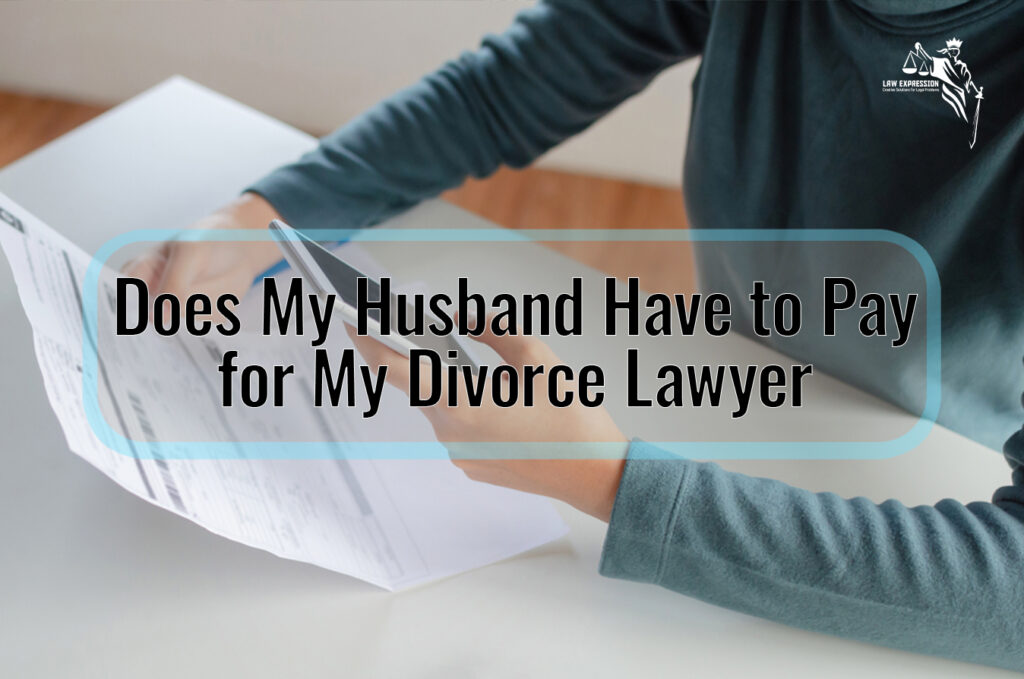Does My Husband Have to Pay for My Divorce Lawyer?
No, your husband does not have to pay for your divorce lawyer. You are responsible for your own legal fees. However, if you cannot afford a lawyer, you may be able to get free or low-cost legal help.
There are many ways to find free or low-cost legal help.
Do I have to pay my spouse’s attorney fees in divorce?
If you’re considering divorce, you may be wondering who will have to pay for your lawyer. In most cases, each spouse is responsible for their own legal fees. However, there are some circumstances where one spouse may be ordered to pay the other’s fees.
In general, each spouse is responsible for their own attorney’s fees in a divorce. However, there are some circumstances where a court may order one spouse to pay the other spouse’s attorney’s fees. This usually occurs when one spouse has significantly more income or assets than the other.
If you’re considering divorce and have questions about who will be responsible for paying your attorney’s fees, it’s important to speak with an experienced divorce lawyer in your state. They can review your individual situation and advise you of your options moving forward.
Does My Husband Have to Pay for My Divorce Lawyer? near Round Rock, Tx
If you’re considering divorce, you may be wondering who will have to pay for your lawyer. Unfortunately, there is no one-size-fits-all answer to this question. In general, each spouse is responsible for paying their own attorney fees.
However, there are some circumstances in which one spouse may be ordered to pay the other spouse’s attorney fees. If you’re concerned about who will have to pay for your divorce lawyer, the best thing to do is discuss it with an experienced divorce attorney. They can evaluate your individual situation and advise you on how likely it is that your husband will be ordered to pay your attorney fees.

Does My Husband Have to Pay for My Divorce Lawyer? near Austin, Tx
If you are considering divorce, you may be wondering if your husband will have to pay for your divorce lawyer. The answer to this question depends on a number of factors, including the financial situation of each spouse and the laws of your state. In some states, courts require both spouses to equally share the cost of legal fees.
Other states give judges discretion to order one spouse to pay all or a portion of the other spouse’s attorney’s fees and costs. And still, others have no specific rule on the issue, leaving it up to the couple themselves to negotiate who will pay what. Texas is one of the latter states; there is no law mandating that either party in a divorce must pay the other’s attorney’s fees.
However, Texas does allow courts to award attorneys’ fees as part of a “just and right” division of property in a divorce proceeding. This means that if one spouse has significantly more income or assets than the other, a court could order that spouse to help pay for their partner’s legal representation. If you are facing divorce and have concerns about who will be responsible for paying your attorney’s fees, it is important to discuss this with an experienced family law attorney in your area.
They can advise you on how these issues are typically handled in your state and help you plan for what lies ahead.
Can My Spouse Make Me Pay Her Divorce Attorney Fees in Texas
As anyone who has gone through a divorce can attest, the process is seldom cheap. In addition to court fees, there are also the costs of hiring an attorney. So, if you’re facing a divorce in Texas, you may be wondering: can my spouse make me pay her divorce attorney fees?
The answer is maybe. While Texas law doesn’t require one spouse to pay the other’s attorney fees, there are some circumstances where a court may order one spouse to do so. For example, if one spouse has been significantly more difficult or combative during the divorce process, the court may order that person to pay their spouse’s attorney fees as a way of level-setting the playing field.
Another situation where one spouse may be ordered to pay another’s attorney fees is if there is a significant disparity in incomes between the two spouses. If one spouse makes significantly more money than the other and can easily afford to pay both their own and their spouse’s attorney fees, while the other cannot, then a court may order that the higher-earning spouse cover both sets of fees. Ultimately, whether or not one spouse will be ordered to pay another’s divorce attorney fees in Texas will depend on the specific facts and circumstances of each case.
So if you’re facing a divorce in Texas and have concerns about who will be responsible for paying attorneys’ fees, be sure to discuss your case with an experienced family law attorney who can advise you of your rights and options under state law.
Who Pays Attorney Fees in Divorce Texas
In Texas, either party to a divorce may be ordered to pay the other party’s attorney fees. The court will consider several factors when making this determination, including:
-The relative financial resources of the parties
-The ability of each party to earn an income
-The nature and complexity of the issues in the case
-Which party is more likely to prevail on the merits of the case
In most cases, each party will be responsible for paying their own attorney fees. However, if one party is unable to afford an attorney and the other party has the ability to pay, the court may order that the wealthier spouse pay some or all of the less fortunate spouse’s attorney fees. This is done in order to level the playing field and ensure that both parties have adequate representation.
Attorneys Fees in Divorce Texas
In Texas, the court may order either spouse to pay the other spouse’s attorney’s fees and costs in a divorce. The court will consider several factors when making this decision, including: – each spouse’s ability to pay their own attorney’s fees and costs;
– each spouse’s financial resources; – the relative need for attorneys’ fees and costs by each party; – whether one spouse has acted inappropriately during the divorce proceedings; and
– any other factor the court deems relevant. Ultimately, the court wants to ensure that both spouses have adequate legal representation and access to justice. If one spouse would be unable to afford an attorney without an award of fees, then the court is more likely to grant a request for fees.
Can My Wife Make Me Pay for Her Lawyer?
If you are asking if your wife can make you pay for her lawyer in a divorce, the answer is usually no. The court will usually order each party to pay their own attorneys fees. However, there are some exceptions to this rule.
If your wife can prove that you have more income or assets than she does, she may be able to get the court to order you to pay her attorney’s fees. Additionally, if your wife can prove that you were the cause of the divorce (for example, if you committed adultery), she may also be able to get the court to order you to pay her attorney’s fees.
Who Pays Attorney Fees in Divorce in Georgia?
In Georgia, the general rule is that each party to a divorce pays their own attorney fees. However, there are some exceptions to this rule. If one party is unable to pay their attorney fees, the court may order the other party to pay a portion or all of the fees.
Additionally, if one party acted in bad faith or was particularly difficult during the divorce process, the court may order them to pay a portion of the other party’s attorney fees.
Who Pays Attorney Fees in Divorce in New York?
In New York, the court may order either party to pay the other’s attorney’s fees in a divorce. The court will consider many factors when making this decision, including each party’s financial resources and ability to pay their own attorneys, the complexity of the case, and whether one party has acted in bad faith. In most cases, each party will be responsible for paying their own attorney’s fees.
What Does a Wife Get in a Divorce?
A wife in a divorce is entitled to an equitable share of the marital property. This includes any property acquired during the marriage, regardless of whose name is on the title. The court will also consider other factors when dividing assets, such as each spouse’s income, earning potential, and ability to support themselves.
In some cases, the court may award spousal support (also called alimony) to one spouse.
Conclusion
If you are considering a divorce, you may be wondering who will be responsible for paying for your lawyer. The answer to this question depends on a number of factors, including the laws of your state and the financial circumstances of your marriage.
In some states, the court will order one spouse to pay the other spouse’s attorney fees if there is a significant difference in their incomes.
This is known as a “Needs-Based Award.” Typically, the higher-earning spouse will be ordered to pay the lower-earning spouse’s attorney fees.
However, even if your state does not have a Needs-Based Award law, the court may still order one spouse to pay the other spouse’s attorney fees if it finds that doing so would be fair and equitable under the circumstances.
For example, if one spouse has been significantly more resistant to Divorce proceedings than the other, the court may find it fair to award attorneys’ fees to level the playing field.
Finally, even if your state does not have a Needs-Based Award law and the court does not find that awarding attorneys’ fees would be fair and equitable under your particular circumstances, one spouse may still agree to voluntarily pay all or part of his/her partner’s attorneys’ fees. This decision is typically made based on each party’s ability to pay and whether paying such fees would cause undue hardship on either party.

